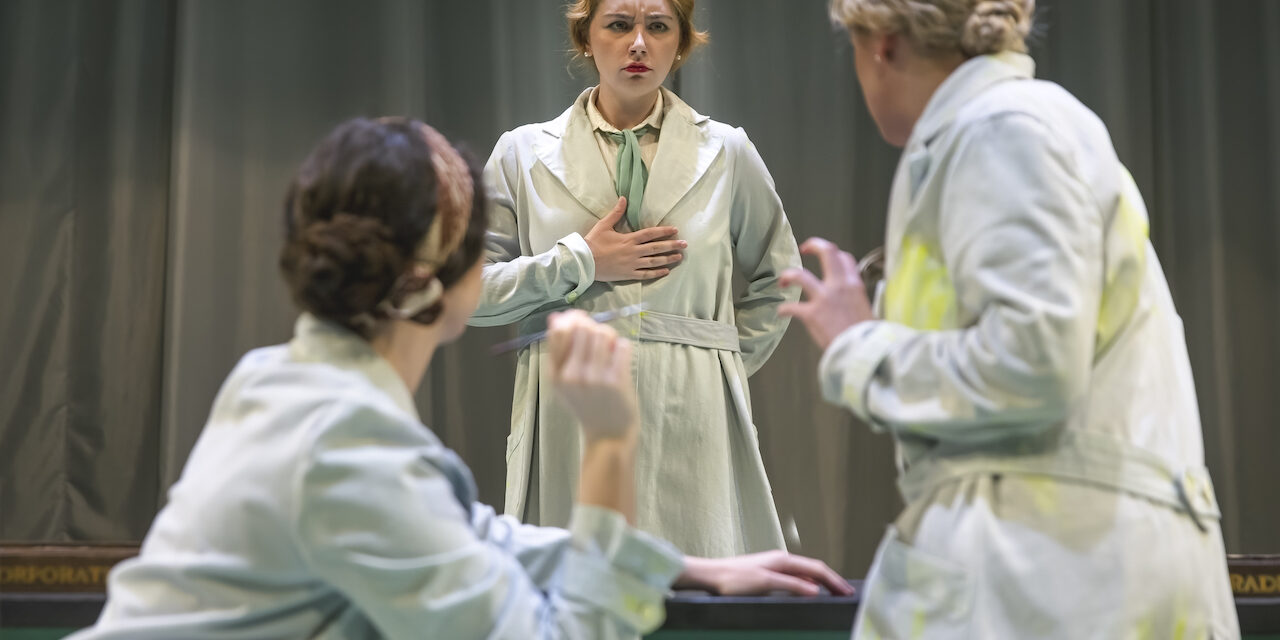
4 – 12 November
A statuary duty of care to employees – that was the glittering prize post 1928 that the so-called ‘Radium Girls’ bequeathed the world. This is their story, how a small group of young women employed to be clock and watch dial painters for the United States Radium Corporation came to fight for compensation after coming into direct contact with the deadly substance through their work.
Radium was commercialised as a miracle product that not only ‘invigorated your health’, but could help soldiers in WWI see their watch and instrument dials at night without the need for further illumination. What was not to like? Surely this was good work saving lives? That many women died young was a tragic consequence of the cavalier then devious attitude of the company they worked for. This excellent production by the Bristol Old Vic Theatre School successfully draws you close to those affected, in particular through the life of dial painter Grace Fryer, whose own body had to be held together with metal braces as she succumbed to the effects of harmful radiation because of her work.
Over two hours in length, the play is exhaustive but not exhausting despite knowing the direction of emotional travel will be steadily downward. As more and more women working at the factory become ill, the fear of a business meltdown begins to exercise the minds of the men running the company. How can they stop this from ‘getting out’, how can they prevent paying out vast compensation payments? In short, how can they pass the buck? How many ‘bent’ lawyers and immoral doctors can be bought off to secure a good business outcome?
Two performances shone out last night, supported by an ensemble of players displaying natural empathy and synchronicity with one another. Drawing an increasingly gripped audience into the story, Ellie Jack as dial painter Grace Fryer and Conor Doran as Arthur Roeder, Company President of the US Radium Company added layer upon layer to their evolving characters – Fryer holding on to, then using her anger to drive against the sophisticated corruption stacked against her, while Doran explored the growing conscience within the increasingly desperate Roeder. As Fryer faces down her bodily ruin, Roeder is left to confront his inner demons, his guilt eating him away like the radium in Fryer’s body – a deadly pas-de-deux given full amplification.
And there was excellent support from Kurtis Thompson as Grace’s boyfriend Tommy, struggling to come to terms with the seriousness of his would-be wife’s illness; Lucy Pascoe as Kathryn Schaub and Louise O’Dowd, playful as fellow dial-painters, unaware the decorative use of the radium paint could be a potential death sentence; Kate Cartwright as consumer champion Katherine Wiley, Tom Canavan as soul-less defence counsel Edward Markley; Gaia Ashwood and Holly Hawgood convincing as young thrusting journos Nancy Harlan and Jackie Youngwood from the The Ledger and The Graphic newspapers, vying for exclusives.
The theatre craft under Nel Crouch’s direction was exemplary – the cast of 15 moved seamlessly across the small empty space, with its backdrop of long white drapes lit with an eerie green glow as the story progressed from factory floor to courtroom, while sound by Chris Monks added ominous notes of unease. But it was the depiction of Fryer’s determination for justice trumping Roeder’s immoral defence of commerce that left a fierce sense of resolve.
★★★★☆ Simon Bishop, 5th November, 2022
Photo credit: Craig Fuller


